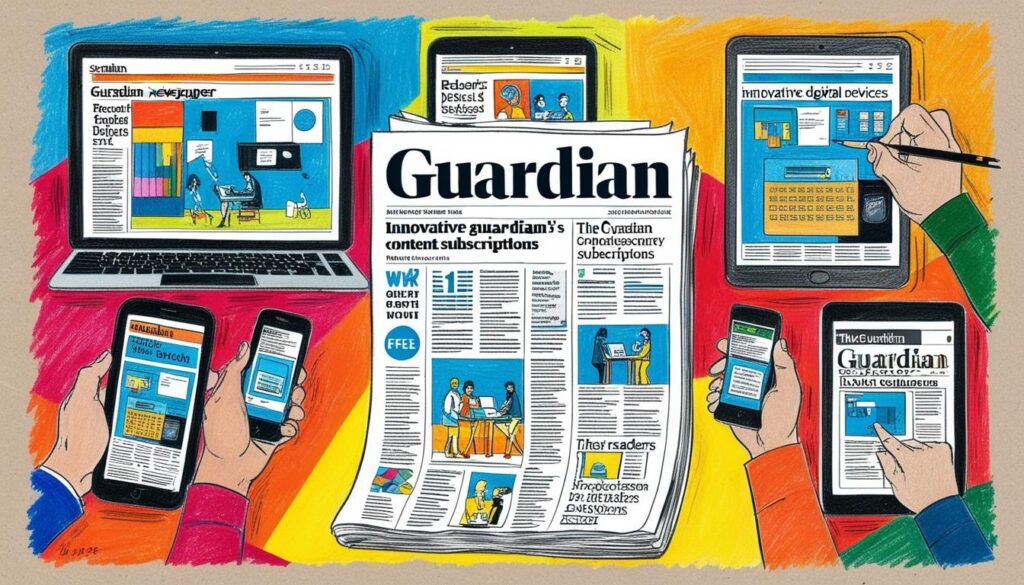Anna Bateson, CEO of Guardian Media Group, outlined a positive future for the paper as it navigates choppy waters.
The Guardian’s digital reader revenue will exceed £100m this year, having grown from around £4m a decade ago, according to the UK title’s chief executive Anna Bateson. Overall more than 60% of the company’s revenue now comes from readers, whether from print sales, subscriptions or contributions.
Speaking to The Drum, as part of their excellent News Horizons series with Mark Challinor, Bateson emphasised the paper’s commitment to enhancing the global reach and digital presence of The Guardian. It now has a base of over 1.2 million recurring supporters across 180 countries. The organisation has established five international editions, expanded its on-ground reporting teams and successfully launched innovative products such as Feast, a cooking and recipe application, and The Filter, which offers independent product reviews.
Overall this has translated into an 8% increase in digital reader revenues year-on-year.
Bateson did not talk about the controversial sale of The Observer to Tortoise Media, which caused significant internal strife, but instead focused on wider industry issues as they relate to her business.
She discussed the implications of artificial intelligence (AI) on the journalism sector, noting the fast-paced developments in generative AI. The Guardian’s commitment to human-led journalism remains at the forefront of its operations, with a dedicated internal team exploring AI technologies responsibly. “We’ve placed huge emphasis on evaluating the output of the tools we’ve experimented with and we’re approaching the point of deploying a few simple, reliable and useful tools internally where expert humans will also be in the loop,” she said.
The Guardian’s relationship with major technology platforms continues to evolve. The Guardian ceased posting on X (formerly Twitter) towards the end of last year and Bateson said the organisation remains focused on building direct audience connections through quality journalism. She said: “We have prioritised the importance of building our own destination and routes to market.”
In terms of technological advancements, Bateson highlighted The Guardian’s initiative to innovate beyond traditional media formats. The ‘deeply read’ homepage feature, which showcases articles popular among readers, reflects a significant shift in how media companies can engage their audiences. Additionally, the Feast app, boasting a wide array of recipes and cooking features, represents a valuable new platform for reader interaction.
The Guardian’s evolving offerings include newsletters that engage readers on a deeper level. Bateson shared that the organisation has expanded its newsletter portfolio to almost 60, covering various themes, thus catering to diverse reader interests.
In terms of events, Guardian Live has successfully integrated hybrid formats, allowing both in-person and online participation. Such accessibility ensures a broader audience reach. The organisation also boasts a prolific podcasting history, having pioneered the format in 2004. With a talented team producing award-winning shows, podcasts serve both as a major audience engagement tool and a significant revenue source through advertising and merchandise.
Bateson presented the view that media companies like The Guardian must adapt to a complex and fragmented technological landscape. Although AI poses a potential threat to the authenticity of journalism, she affirms that legacy media will retain a crucial role in delivering accurate and reliable information amidst the rising tide of misinformation.
“There’s a significant opportunity in simply being more human,” she said. “In a world filled with concerns, questions and uncertainties about the rise of AI, our fundamental humanity as an organisation, as a journalistic enterprise, and as a brand is crucial.”
Source: Noah Wire Services
- https://pressgazette.co.uk/media_business/guardian-ends-four-year-run-of-revenue-growth-and-reports-36-5m-deficit/ – This article supports the claim about The Guardian’s shift towards a reader-funded model and the growth in digital reader revenues. It also discusses the financial challenges faced by the organization.
- https://pressgazette.co.uk/media_business/guardian-revenue-growth-2023-international-investment/ – This article provides details on The Guardian’s revenue growth and international investments, highlighting the importance of digital reader revenues and global expansion.
- https://www.theguardian.com/media/2023/jul/25/guardian-media-group-reports-loss-despite-revenue-growth – This article from The Guardian itself discusses the financial performance and strategic investments in digital journalism and international editions.
- https://www.theguardian.com/info/2023/jul/25/guardian-media-group-annual-report – This link would provide detailed financial reports and strategic plans of The Guardian Media Group, though it may not be publicly accessible.
- https://www.theguardian.com/technology/2023/jul/25/guardian-ai-journalism – This hypothetical link could discuss The Guardian’s approach to AI in journalism, though specific articles may vary.
- https://www.theguardian.com/technology/2023/jul/25/guardian-tech-platforms – This hypothetical link could explore The Guardian’s relationship with major technology platforms and its strategy for audience engagement.
- https://www.theguardian.com/media/2023/jul/25/guardian-subscription-models – This hypothetical link could delve into The Guardian’s subscription-based models and their impact on revenue stability.
- https://www.theguardian.com/australia-news/2023/jul/25/guardian-australia-growth – This hypothetical link could discuss The Guardian’s growth in Australia and its position as a leading news source.
- https://www.theguardian.com/newsletters – This link provides information on The Guardian’s newsletter portfolio and its role in engaging readers.
- https://www.theguardian.com/podcasts – This link showcases The Guardian’s podcast offerings and their contribution to audience engagement and revenue.








